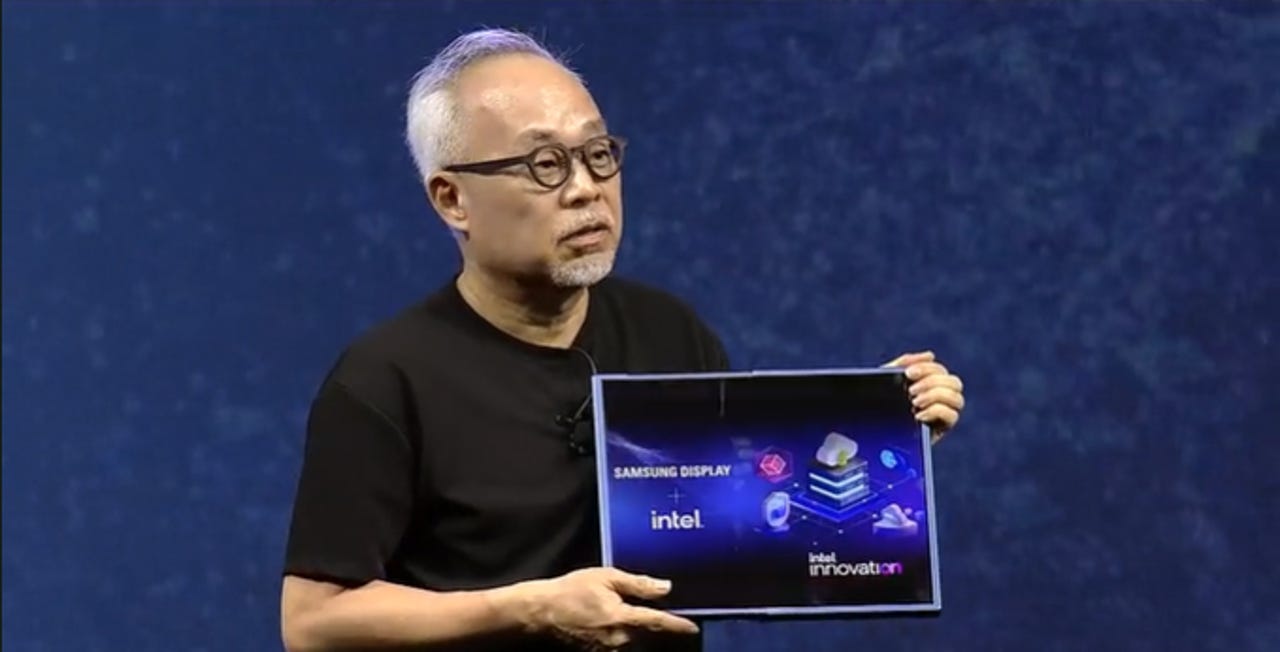
































Enter the 'slideable' PC.
Image: IntelGet ready for a new category in the PC market: the 'slideable', which brings flexible OLED to the PC in the way the display technology spawned the foldable smartphone.
Intel and Samsung teased the new would-be slideable category at Intel's Innovation conference, showing off a device that looks like a tablet, lacks a physical keyboard, and has a screen that rolls out from 13 inches to 17 inches.
Could this be the PC form factor that brings more Intel chips to Android devices, or Windows tablets that challenge Apple's M1 iPads?
Intel CEO Pat Gelsinger and Samsung's head of displays, J.S. Choi, showed the 17-inch slideable as the first example of its OLED slideable technology for Intel-based PCs.
Also:The 10 best Windows laptops: Top notebooks, 2-in-1s, and ultraportables
Choi said it was "the world's first 17-inch slideable display for PCs", which he expects will satisfy various needs for portability and larger screens.
The demo model expands what's possible for PCs with OLED display technology within a flexible plastic substrate.
"Foldable is gone, but it's just the beginning," said Choi, although it was unclear whether he was referring to PCs or foldable smartphones. He added: "With this slideable flex and software collaborations, we expect to see better and best user scenarios of PC in the future."
On the topic of bridging PCs to smartphones, Intel said its Unison app for connecting Android phones to PCs will start rolling out on select 12th-gen Intel Core processor-based Evo PCs this year.
Intel also showed off its 13th-gen 'Raptor Lake'-architecture chips, a refinement to its 12th-gen answer to Apple Silicon processors, which introduced CPU cores optimised for performance and efficiency. The 13th-gen chips have double the number of efficiency cores than the previous generation.
Gelsinger opened his keynote by pronouncing that Moore's Law, which is slowing, is not dead. "Is Moore's Law dead? And the answer is no," said Gelsinger. "We will continue to be the stewards of Moore's Law. You got it? Alive and well."
In February, Intel announced it would buy Israel-based Tower Semiconductor for$6 billion to bolster Intel Foundry Services (IFS). Gelsinger hopes this will become a nexus of chip manufacturing, with 'chiplets' supplied by TSMC, Texas Instruments, Samsung and others via the new UCIe, the Universal Chiplet Interconnect Express standard.
Referring to IFS, Gelsinger said the industry is "moving from system on chip (SoC) to system on package".
"There has to be greater packaging and even Gordon Moore, when he wrote his original paper on Moore's Law, he foresaw this day of reckoning where we'll need to build larger systems out of smaller functions combining heterogeneous, customized situations. And with...3D stacking, this gives the ability to increase the number of transistors per device."
 Hot Tags :
Business
Companies
Hot Tags :
Business
Companies